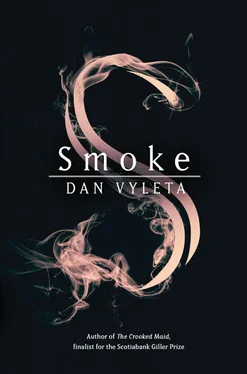“How much do you need?” she finds herself asking.
He does not appear to have heard, sits on the ground and plays with Soot.
“Ah, there’s the rub,” he mutters at length, letting some flakes rain from his fingertips. “Two thousand two hundred cubic centimetres. It seemed little enough on the chalkboard, when I did the maths.”
Again she finds her mind reeling, starts walking abruptly, in demented circles, as though searching for sense through the geometry of movement. Her steps displace fresh motes of Soot that swirl around the hem of her dress, half harbingers, half retinue, as unsettled as she.
“We saw a row of rectangles,” she says into their dance, still pacing, not looking at him, no longer able to bear the sight of his hale face. “On your secret map of the sewers. Pools, we think. What’s in those pools?”
“Oh, it’s very clever, Miss Livia, very clever, if I say so myself. At first glance, a simple problem of filtration. Water, dirt, Soot. But the devil’s in the details!”
She pictures it; imagines an aquarium as dark as her mustard jar, and a child’s open vein fertilising its mucoid tar. “The Great Quickening — you are making Juliuses!” she whispers, as though infected by Sebastian’s incoherence. Then — that part of her mind quite separate from her anger — she notices something in the fireplace: quite literally a scrap of hope. She drops to her knees, heat flushing her face.
“I just cannot fathom it,” she says, no longer hopeful for an answer, wishing only to distract him, her fingers sorting through hot embers. “All along I thought you would end the Smoke. Why this? Release more darkness into the world? The streets will run with blood.”
He takes a swig from his bottle before answering and emerges in a new stage of drunkenness: sadder, sentimental, sleepy.
“Blood?” he repeats as though suddenly unfamiliar with the word, nods off, eyes slowly closing, a baby after his feed; then jerks upright with a thought: “And did you know that in France, at the height of the Terror, they built a temple to Reason and a new type of clock designed to tame the irrationality of time?”
Drunkenly, dreamily, he begins lecturing her on the beauty of the decimal system and the division of the earth’s daily revolution into tenths. But Livia is no longer listening. She rises, stills the madness of her pulse.
“You won’t help me find Mother,” she speaks into his flow of slurry eloquence. “Then I must leave.”
She says it simply, despair replaced by purpose. A shred of paper is burning in her fist.
ф
Sebastian helps her, unexpectedly. Gathers himself up from the floor, the plum brandy finished, fetches his hat but not his coat, and offers to lead off the watchers to ensure her escape.
“A perambulation! Ein Spaziergang. Why shouldn’t a man go for a midnight walk? If they pounce,” he continues, “I have this,” patting the bottle of laudanum poking out of his smoking jacket.
“ Auf Wiedersehen ,” he announces, opening the door and pressing his coin purse on her as though in thanks for an illicit assignation. “In a newborn world!
“Black rain,” he confides, half shivering. “I have been dreaming of black rain. The wind blows northerly tonight. In from the sea!”
She stands by the hallway window of the second floor and watches him emerge from the hotel’s front doors. He surveys the square, slowly and theatrically, then starts walking in a mincing, unsteady gait. Five yards on a giggle shakes his frame, and he darts to the left down the shadows of an alley. For a heartbeat nobody reacts. Then the men posted in the square all fling themselves into pursuit. Four men, rather than the three Thomas counted: one of the vagrants leaps up from his dirty blanket and joins the chase. A fifth man bursts from the hotel. Their departure is so conspicuous that it raises a cheer and laughter from the drunks, beggars, and ragamuffins that still populate the square. Livia takes it as her signal to leave. The stairwell is empty, the night porters standing in a huddle on the steps outside, wondering at the noise. Within a minute she stands breathless in the shadowy corner where she left Charlie and Thomas. They don’t see her at once, are absorbed in discussion, Charlie talking intently, soothingly at his friend. Thomas’s shoulders are hunched, his good arm raised in front of him, warding Charlie off. His hand is so swollen it looks like a mitt.
They catch sight of her in the same instant. For all their differences their faces show the same expression. Concern. Relief. Love. She smiles despite herself and they each smile back; even Thomas, past his hurt. A moment’s happiness in the chaos of their lives. Then Livia does what has to be done.
She spoils it.
“I know what they are up to,” she says. And: “I have an address.” She unfolds the fist she made ten minutes ago. “He burnt this. Of all the papers he was reluctant to burn, he made sure to burn this!”
They stare at the scrap of paper like it will provide salvation. It is ripped in half and scorched black, had floated up on the chimney’s hot draft and then got stuck upon the brickwork of the fireplace’s outer lip, the paper’s edge still fire-red and smouldering when she snatched it. Together they read the few legible words. A company name and a street address. “Ryman’s Fine Tobacco Products. Manufactory and Wholesale.” The opening line promises a detailed report on the progress made on the construction work performed within the factory cellars. The next line has been eaten by the flame.
A cigarette factory. Construction in its cellar.
A gateway to the sewers.
“How will we find it?” asks Charlie.
“Sebastian gave me money,” Livia answers, displaying the purse. “So I could ride home in a cab. We must hurry,” she adds. “Two thousand two hundred cubic centimetres. How much blood does a human child hold?”
It’s a dead end, sir. This one’s had it and that one won’t talk. And just look at the dog. It’s his scent she followed. And now she’s grieving over him.”
“He’s not dead.”
They came in without knocking, or at least I did not hear them. Suddenly they were there. Gentlemen in suits. And a crippled dog dragging its hindquarters on a little two-wheeled cart. It has been strapped to it with a belt. A fat man holds the leash.
“He’s not dead,” I say again and this time my lips move with the words. I don’t want them to leave me alone again. Not while he— it —is still in the room.
The fat man hears me. He walks over to the water jug and pours me a glass. While he watches me drink he orders one of his men to hold a mirror to its mouth.
“I can hear ’im breathing,” I say. “He’s broken. But I can hear ’im breathing all the same.”
The fat man nods as though he understands, pulls up a chair and sits next to me.
“Tell me what happened here. We already know the half of it. Lady Naylor was here, and perhaps also her daughter. And a man came to visit, I should wager, a bookish man with a foreign accent.”
She nods.
“Do you live here alone?”
“My ’usband is away.”
“What about that boy over there?”
I do not look where he is pointing.
“He came here. I don’t know why. He hit me. But mostly he just held me. Held me close. His Smoke—” I break off. “He isn’t human.”
The fat man nods, pats my hand, and asks me gently worded questions. I answer a surprising number. Somehow, it is good to talk.
I do not tell them about my husband. Not about his condition, nor that he went along with her. Nor do I put into words what it has been like, sitting there, listening to it breathe, so faintly that half the time I convinced myself it was already dead. Sitting there, alone in the dark, listening, trying to pluck up the courage to cut its throat. I could have left, I suppose. It’s like it was when I was living with Father, yearning for escape. I could have left. Even before Tobias. But you never do, do you? You sit in the dark and endure.
Читать дальше












